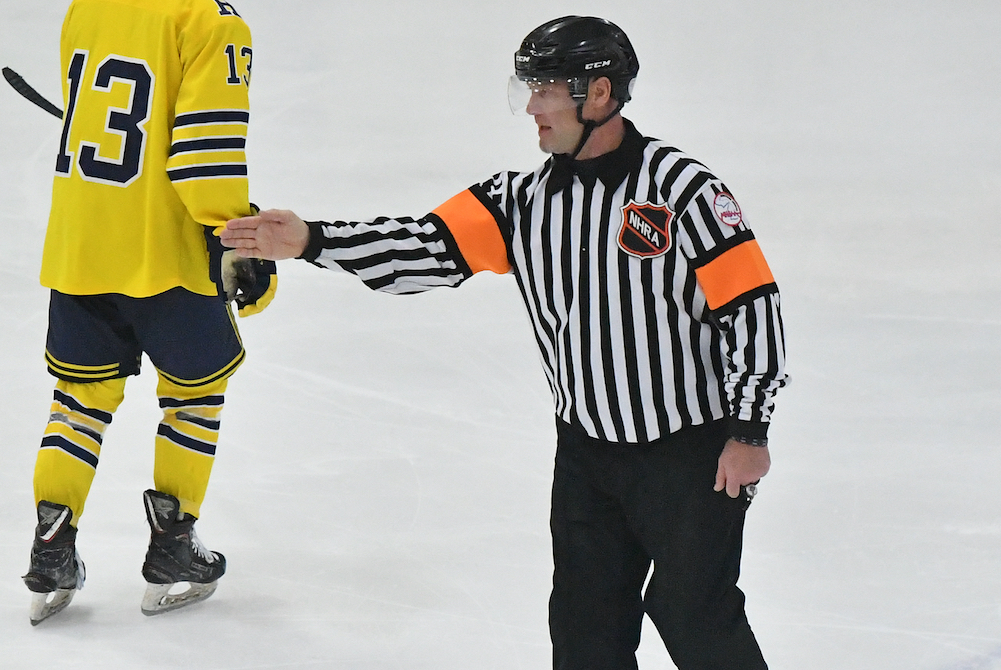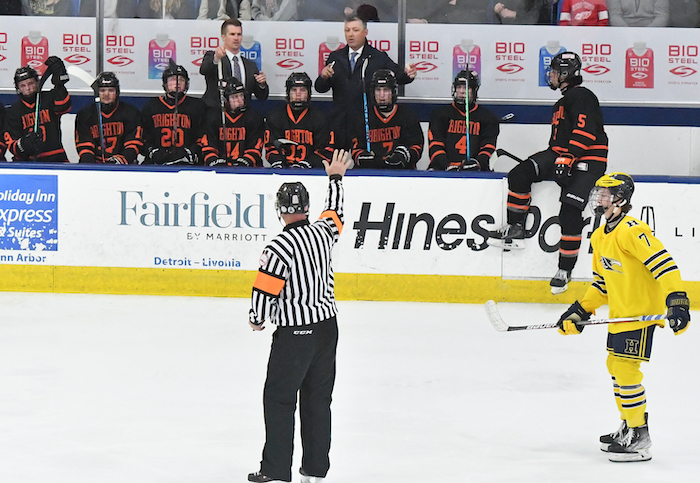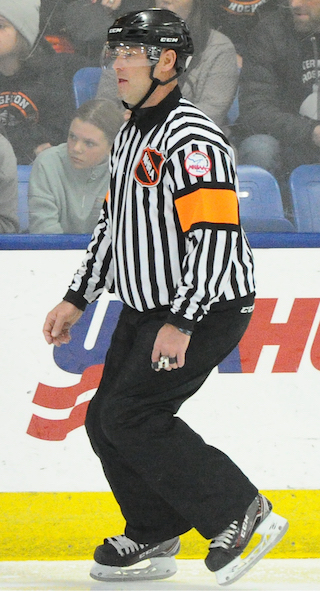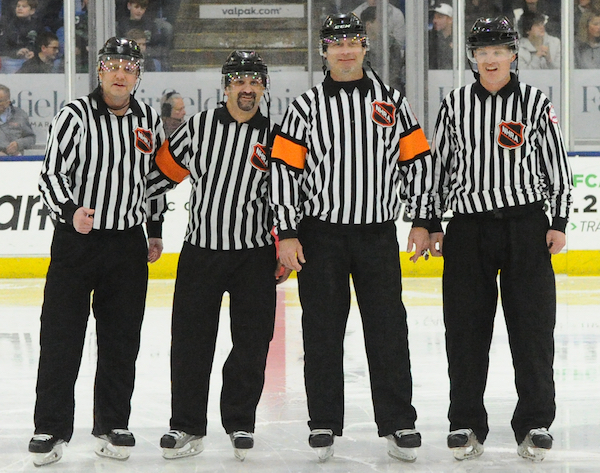
Minter's Contributions Worth a Mint
April 9, 2013
By Geoff Kimmerly
Second Half editor
Tom Minter admits his wife Linda knows the spiel well. She's been hearing it spun for years.
The recently-retired MHSAA assistant director might be chatting up a recent grad at his or her high school open house, or talking with a former athlete whose playing days are done but love for a sport hasn't waned.
 “When I recruit officials, I tell them, ‘Hey, you can stay in a game you know something about. It’s good exercise. You stay with the kids, who help keep you young, and it’s one of the few hobbies that pays you,’” Minter said.
“When I recruit officials, I tell them, ‘Hey, you can stay in a game you know something about. It’s good exercise. You stay with the kids, who help keep you young, and it’s one of the few hobbies that pays you,’” Minter said.
He knows all to be true after 48 years running the fields and courts of Michigan’s high schools, and more than a half-century total as a referee and umpire who worked his most recent girls soccer game just a few days ago in Ovid-Elsie.
Minter, an official for nine MHSAA Finals and longtime clinician and trainer of referees and umpires all over the state, has been selected to receive the MHSAA’s Vern L. Norris Award for 2013.
The Norris Award is presented annually to a veteran official who has been active in a local officials association, has mentored other officials, and has been involved in officials’ education. It is named for Vern L. Norris, who served as executive director of the MHSAA from 1978-86 and was well-respected by officials on the state and national levels. Minter will be honored at the Officials’ Awards & Alumni Banquet on May 4 at the Kellogg Center in East Lansing.
Minter also worked at the MHSAA’s home office from September 1995 through January 2012 and so knows or is familiar with just about every Norris winner before him – making this award extra meaningful.
While the desire to remain part of the games after his playing career ended led to Minter’s early involvement, the opportunity to pass on what he’s learned keeps him immersed in the officiating community.
“Hopefully now I’m able to pass some of this on and to encourage, provide the listening ear like people provided to me in the past,” Minter said. “It’s created in me a sense of legacy.
“To be in the company of people like Vern Norris and Dick Kalahar and all the other winners, it’s just the recognition that you’ve made a contribution. That is so satisfying.”
 Minter began his officiating career while a student at a U.S. Air Force base high school overseas. Natives of Akron, Ohio, the family followed Minter’s father – who worked for Goodyear Tires – to Scotland in 1958.
Minter began his officiating career while a student at a U.S. Air Force base high school overseas. Natives of Akron, Ohio, the family followed Minter’s father – who worked for Goodyear Tires – to Scotland in 1958.
Minter played mostly baseball to that point, and didn’t know much about the pastime of his new home – soccer. But on suggestion of his physical education teacher – who also had played pro soccer – Minter took up officiating the sport to fast-forward his education in the game.
Minter refereed his first high school soccer game in 1961, and played at the high school and college levels. After also officiating for a year in Ohio, Minter began officiating in Michigan while a student at Jackson Community College. He graduated from Jackson Community College in 1966 and Michigan State University in 1971, and also served a stint with the U.S. Army.
Minter has worked games in football, boys and girls basketball, boys and girls soccer and baseball and has served as an officials assignor both at the high school and college levels; he currently is secretary for the Greater Lansing Area Soccer Officials Association. He worked five baseball MHSAA Finals, two football and one each in boys and girls soccer before joining the MHSAA staff in 1995 as the selection from nearly 200 candidates for his position.
As part of the announcement that Minter would be joining the staff as assistant to executive director John E. “Jack” Roberts, Roberts compared Minter to a versatile running back – capable of handling a variety of in-office obligations while also able to ‘bounce to the outside’ and assist with administration of sport services to member schools.
Among many contributions as an MHSAA employee, Minter was assistant director in charge of boys and girls soccer and oversaw construction of the MHSAA’s home office, which opened in December 1996. Although retired, he remains a versatile contributor providing assistance to the MHSAA in East Lansing and high school athletics on a national level.
“Tom Minter continues to help with capital improvement projects at the MHSAA office, and he continues to represent the National Federation (NFHS) Officials Association on its Sports Medicine Advisory Committee,” Roberts said. “His many contributions to high school athletics, and especially officiating, continue to be far-reaching. We are delighted to recognize Tom Minter with the Vern L. Norris Award.”
Minter came to the MHSAA after serving as Meridian Township Treasurer for 19 years and also as a volunteer fireman for that community, which includes Haslett and Okemos. Minter was an Ingham County commissioner for six years and served on Meridian Township’s planning commission and zoning board of appeals, and has been a member of the Haslett/Okemos Rotary Club for 36 years – including as its president in 1985-86.
He currently serves as chairperson of the Governor’s Council on Physical Fitness, Health and Sports, a 15-member body established in 1992 that promotes the increase of physical activity and improvement of health for Michigan residents. He was first appointed in February 2012 and serves with Kalamazoo’s Ron Winter, a friend going back to their days at MSU and a current referee in the National Football League.
Minter also continues to work as a Big Ten football replay official and observer of officials for the Great Lakes Intercollegiate Athletic Conference – for which he served as an on-field official for 25 seasons including eight as crew chief. He also worked in the Mid-American Conference and Michigan Intercollegiate Athletic Association.
All allow him to provide a wealth of knowledge to those continuing to hone the officiating craft – especially when it comes to tangible aspects like rules, mechanics and the like.
But working for the MHSAA fulltime gave Minter a unique perspective on the intangibles of officiating at the high school level – like keeping in perspective that athletes are high school students, enjoying athletics as part of the education process.
The value of providing such mentoring will be a significant part of his brief acceptance speech May 4.
“We’re all here because we worked 20, 30, 40, 45, 50 years. What are we doing to ensure our replacements?” Minter said. “That’s what we have to do, to ensure that we leave a replacement.”
High school game officials with 20, 30, 40, 45 and 50 years of service also will be honored at the Officials’ Awards & Alumni Banquet on May 4. Tickets for the banquet are available to the public and priced at $20. They will not be sold at the door. Tickets can be ordered by calling the MHSAA office at (517) 332-5046 or by sending the order form available at this link.
Previous recipients of the Norris Award
1992 – Ted Wilson, East Detroit
1993 – Fred Briggs, Burton
1994 – Joe Brodie, Flat Rock
1995 – Jim Massar, Flint
1996 – Jim Lamoreaux, St. Ignace
1997 – Ken Myllyla, Escanaba
1998 – Blake Hagman, Kalamazoo
1999 – Richard Kalahar, Jackson
2000 – Barb Beckett, Traverse City; Karl Newingham, Bay City
2001 – Herb Lipschultz, Kalamazoo
2002 – Robert Scholie, Hancock
2003 – Ron Nagy, Hazel Park
2004 – Carl Van Heck, Grand Rapids
2005 – Bruce Moss, Alma
2006 – Jeanne Skinner, Grand Rapids
2007 – Terry Wakeley, Grayling
2008 – Will Lynch, Honor
2009 – James Danhoff, Richland
2010 – John Juday Sr., Petoskey
2011 – Robert Williams, Redford
2012 – Lyle Berry, Rockford
PHOTOS: (Top) Longtime official Tom Minter signals a score during a 2010 football game. (Middle) Minter awards Williamston girls soccer coach Jim Flore an MHSAA runner-up trophy in 2010.

Retired NHL-er Back on Ice to Answer Call - By Making Them
By
Rob Kaminski
MHSAA benchmarks editor
March 16, 2023
The most accomplished skater on the ice during Friday’s triple-overtime MHSAA Division 1 Semifinal hockey thriller between Hartland and Brighton was not wearing the school colors of either team.
In front of a packed house at Plymouth’s USA Hockey Arena, referee Bryan Smolinski was in stripes, just like the rest of his officiating crew.
In his former life, he pulled on plenty of sweaters before lacing up the skates. That happens when one logs more than 1,000 games, tallies nearly 300 goals (274) and close to 400 assists (377) with eight teams spanning a 15-year playing career in the National Hockey League.
So, how did the 52-year-old former star player find himself on the ice last weekend as one of the referees for the pinnacle weekend of this high school season? Good question, even for the man known as “Smoke” during his playing days.
“I was working in youth development programs a few years back and reached out to some Michigan guys I had connections with about other ways to help the game,” Smolinski said. “I called Kevin May just to chat and asked, ‘Hey, how’s your reffing going?’ He said, ‘You know, we’re down a little bit,’ then said, ‘Why don’t you do it?’ I said, ‘Not a chance,’” Smolinski laughed.
Never Say Never
May persisted, imploring his friend to skate with him during a Fall league at Cranbrook in Bloomfield Hills. After eight weeks, once a week, Smolinski had a revelation.
“I’m like, ‘I’m kind of diggin’ this,’” Smolinski said “So, I did all the testing, and the educational part of it, and I really enjoyed it. I got with Danny (DiCristofaro) and his group, and he put me in as much as he could, and I really started to get my feet wet.”
 DiCristofaro is the assigner and referee-in-chief for the MHSAA’s Northeast Hockey Referees Association, and he has seen Smolinski’s growth first-hand.
DiCristofaro is the assigner and referee-in-chief for the MHSAA’s Northeast Hockey Referees Association, and he has seen Smolinski’s growth first-hand.
“Obviously he’s got great instincts and a feel for the game, along with a wealth of experience, all of which has allowed him to climb the ladder quickly,” said DiCristofaro. “It’s been a joy to watch his growth as an official.”
Fast forward to last Friday, and there were Smolinski and May sharing duties as referees during the MHSAA Semifinal with linesmen Michael Andrews and Thomas Robbins.
In between, there has been a learning curve that still continues, but the jump to officiating was not quite as daunting as his introduction to the NHL.
“I was scared to death. My first game was against Mario Lemieux. I’m in the old Boston Garden and now I’m playing against these guys and it’s their job, and they’re out there trying to make a living,” Smolinski recalled.
The emotions were not running nearly as frenzied for his first game as an MHSAA official, obviously, yet respect came in a different form.
“I couldn’t pick the puck up, I was breathing heavily; it was Kevin and me doing a two-man game in Brighton,” Smolinski recalled. “There were a few high-end kids playing, and I’m thinking, ‘I’m dying here.’ You know, there’s no training for that first time.”
What that experience did, however, was revitalize Smolinski in a new way. His playing career is well documented, not only in the NHL, but around Michigan. He enjoyed an honor-laden career at Michigan State University from 1989-93 before joining the Boston Bruins (who had drafted him three years earlier) at the end of the ’93 NHL campaign. Even after his final season, with Montreal in 2007-08, he stayed in the game via men’s leagues, or coaching his son, Max.
Smolinski and his wife, Julie, have three daughters: Ashtyn (22), Jojo (16) and Rylen (12), along with Max, whom dad coached for seven years including during a national championship run with a Little Caesars U15 team in 2019. Max, 19, is now playing collegiately at Rensselaer Polytechnic Institute.
So, for Smolinski, officiating offers a new chapter.
“Reffing brought back ... I wouldn’t say love of the game, because that’s always been there; it’s a different side of enjoying the game now. I have no horse in the race, my son’s off to college, my daughters are doing their thing; I wanted to find something new in the game,” Smolinski said. “I’ve coached, and I don’t want to do that. I found this, and I’ve stuck with it.”
Old College Ties
One of the great benefits of athletics at any level are the friendships made. For two kids who met in their first years on the MSU campus and forged a bond that lasts to this day, it’s amazing how their careers reached the pinnacle and have now come full circle.
Wes McCauley, an MSU teammate, is one of Smolinski’s best friends. After numerous years in the minor leagues, McCauley, like his friend, made it to the NHL. But McCauley made it as an official, working his first NHL game in 2003, when Smolinski was nearing the end of his playing career.
 Their games lined up on just a few occasions in the NHL, and the two lobbied hard to have McCauley work Smolinski’s 1,000th career game in his final season with the Canadiens in 2007-08. The request, sadly, was denied by the league.
Their games lined up on just a few occasions in the NHL, and the two lobbied hard to have McCauley work Smolinski’s 1,000th career game in his final season with the Canadiens in 2007-08. The request, sadly, was denied by the league.
On the rare occasions when the friends did share the same ice, less than a handful by Smolinski’s count, it was McCauley who was forced to rebuff any attempts at fraternization. It’s just part of an official’s edict.
“For both of us, it was amazing; it was just great,” Smolinski said. “I’d say, ‘Hey man what’s up?’ and he says, ‘Can’t talk.’ I’m like, ‘What do you mean, we talk all the time.’ Again, he’s like, ‘Can’t talk, get away from me.’ You know, it was just business.”
McCauley then reached the 1,000-game plateau himself in 2018 and is still going strong as a regular selection for playoff duties with nine Stanley Cup Finals assignments, including last year.
So, it should have been natural for Smolinski to go to his old friend immediately for officiating pointers once he joined the ranks, right? Well, maybe not immediately.
“I talk to Wes all the time, but I actually hid it from him right out of the gate because I didn’t want to take his razzing. Eventually it got out, and he was loving it. He started sending me whistles and visors and pants,” Smolinski said, grinning. “And none of it fit, you know, because I’m older and fatter, and he’s so damn skinny. So, I still had to go out and get all new gear.”
Both Sides Now
Having been to the top of his profession, now moving to the other side of that same mountain that his friend McCauley scaled, the respect has grown for those blowing the whistle.
“The preparation for officiating is much more mental,” Smolinski said. “Way more rules oriented. You’re always trying to get away with things that you can as a player; now you have to police that.”
Smolinski has a distinct advantage.
“I know everything they’re trying to do because I’ve done it. I know where you’re going with the puck, I know what kind of breakout you’re trying to do,” Smolinski said. “I have all the instincts, now I just try to stay out of the way and not ruin their game. The most fun is watching the game develop and the ups and downs. For me to be out there and enjoy it with them, that’s the fun part.”
 Those who have played hockey at any level have a built-in advantage should they consider the officiating avocation: the ability to skate. Unlike officiating in any other sport, skating is a prerequisite. This makes the pool limited, and almost solely composed of former players. Smolinski offers this advice.
Those who have played hockey at any level have a built-in advantage should they consider the officiating avocation: the ability to skate. Unlike officiating in any other sport, skating is a prerequisite. This makes the pool limited, and almost solely composed of former players. Smolinski offers this advice.
“I prefer sticking with high school because I think there’s more decorum, more administrative structure. Kids are playing for their schools, there’s loyalty there,” said Smolinski. “And there is more accountability. People need report to athletic directors and supervisors. Other levels can be more loosely governed, or a bit more maverick in nature. Moms and dads get involved more, coaches maybe know a little less,” said Smolinski.
He has, in fact, worked a handful of non-school games, and there’s a stark difference.
“I wanted to see what was going on, and I see it first-hand,” Smolinski said. “There are some crazy people and parents out there, and these guys are getting absolutely tortured. I’ve been tortured. There has to be a level of respect for what officials do. I think schools can rein that in a little more. All the guys I’ve met give up a lot of time and work hard because they love to do it and love the game.”
All sports need an assist from school administration and from those who once played the games to keep the officials recruitment moving in the right direction. People like Smolinski can help.
“He clearly doesn’t need to do this, and that’s what makes it so fantastic,” DiCristofaro said. “We need more people who have played – at any level – to do what he’s done and stay in the game as officials.”
Smolinski continues to promote the game in other ways as well. Currently, he is involved in the NHL’s Learn To Play initiative, which aims to inspire youth and welcome more families into the hockey community.
“We work hand-in-hand with the NHL Players Association for player development and industry growth,” Smolinski said. “Ages 5 to 9 are introduced to hockey, get head-to-toe gear and instruction, and meet some former players.”
The idea is to have fun first, which can translate into years and maybe even a lifetime in the sport. It’s a lifetime that has given Smolinski so much and continues to do so as he watches it unfold for others from his new vantage point.
PHOTOS (Top) MHSAA official Bryan Smolinski signals during Friday's Division 1 Semifinal between Brighton and Hartland. (2) Smolinski, a retired NHL standout, communicates with the Bulldogs' bench. (3) Smolinski keeps watch during game play. (4) Smolinski, third from left, with his crew: Michael Andrews, Kevin May and Thomas Robbins.

